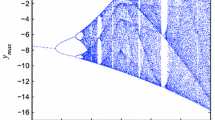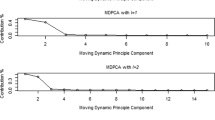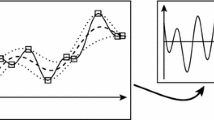Abstract
Slow feature analysis (SFA) is a time-series analysis method for extracting slowly-varying latent features from multi-dimensional data. In this paper, the probabilistic version of SFA algorithms is discussed from a theoretical point of view. First, the fundamental notions of SFA algorithms are reviewed in order to show the mechanism of extracting the slowly-varying latent features by means of the SFA. Second, recent advances in the SFA algorithms are described on the emphasis of the probabilistic version of the SFA. Third, the probabilistic SFA with rigorously derived likelihood function is derived by means of belief propagation. Using the rigorously derived likelihood function, we simultaneously extracts slow features and underlying parameters for the latent dynamics. Finally, we show using synthetic data that the probabilistic SFA with rigorously derived likelihood function can estimate the slow feature accurately even under noisy environments.
Access this chapter
Tax calculation will be finalised at checkout
Purchases are for personal use only
Preview
Unable to display preview. Download preview PDF.
Similar content being viewed by others
References
Wiskott, L., Sejnowski, T.J.: Slow Feature Analysis: Unsupervised Learning of Invariances. Neural Comput. 14, 715–770 (2002)
Berkes, P., Wiskott, L.: Slow Feature Analysis Yields a Rich Repertoire of Complex Cell Properties. J. Vis. 5, 579–602 (2005)
Franzius, M., Sprekeler, H., Wiskott, L.: Slowness and Sparseness Lead to Place, Head-Direction, and Spatial-View Cells. PLoS Comput. Biol. 3, 1605–1622 (2007)
Sprekeler, H., Wiskott, L.: A Theory of Slow Feature Analysis for Transformation-Based Input Signals with an Application to Complex Cells. Neural Comput. 23, 303–335 (2011)
Berkes, P.: Pattern Recognition with Slow Feature Analysis. Cognitive Sciences EPrint Archive (CogPrint) 4104 (2005)
Franzius, M., Wilbert, N., Wiskott, L.: Invariant Object Recognition with Slow Feature Analysis. In: Kůrková, V., Neruda, R., Koutník, J. (eds.) ICANN 2008, Part I. LNCS, vol. 5163, pp. 961–970. Springer, Heidelberg (2008)
Legenstein, R., Wilbert, N., Wiskott, L.: Reinforcement Learning on Slow Features of High-Dimensional Input Streams. PLoS Computational Biology 6, 1–13 (2010)
Huang, Y.P., Zhao, J.L., Liu, Y.H., Luo, S.W., Zou, Q., Tian, M.: Nonlinear Dimensionality Reduction Using a Temporal Coherence Principle. Inform. Sci. 181, 3284–3307 (2011)
Turner, R., Sahani, M.: A Maximum-Likelihood Interpretation for Slow Feature Analysis. Neural Comput. 19, 1022–1038 (2007)
Tipping, M.E., Bishop, C.M.: Probabilistic Principal Component Analysis. J. Royal Stat. Soc. 61, 611–622 (1999)
Beckmann, C.F., Smith, S.M.: Probabilistic Independent Component Analysis for Functional Magnetic Resonance Imaging. IEEE Trans. Med. Im. 23, 137–152 (2004)
Pearl, J.: Probabilistic Reasoning in Intelligent Systems. Morgan Kaufman (1988)
Sekiguchi, T., Omori, T., Okada, M.: Effect of Observation Noise in Probabilistic Slow Feature Analysis. IPSJ Trans. Math. Model. Appl. (in press)
Sekiguchi, T., Omori, T., Okada, M.: Belief Propagation for Probabilisitic Slow Feature Analysis. IEICE Tech. Rep. (2011)
Omori T., Sekiguchi, T., Okada, M.: (in prep.)
Author information
Authors and Affiliations
Editor information
Editors and Affiliations
Rights and permissions
Copyright information
© 2013 Springer-Verlag Berlin Heidelberg
About this paper
Cite this paper
Omori, T. (2013). Extracting Latent Dynamics from Multi-dimensional Data by Probabilistic Slow Feature Analysis. In: Lee, M., Hirose, A., Hou, ZG., Kil, R.M. (eds) Neural Information Processing. ICONIP 2013. Lecture Notes in Computer Science, vol 8228. Springer, Berlin, Heidelberg. https://doi.org/10.1007/978-3-642-42051-1_15
Download citation
DOI: https://doi.org/10.1007/978-3-642-42051-1_15
Publisher Name: Springer, Berlin, Heidelberg
Print ISBN: 978-3-642-42050-4
Online ISBN: 978-3-642-42051-1
eBook Packages: Computer ScienceComputer Science (R0)




